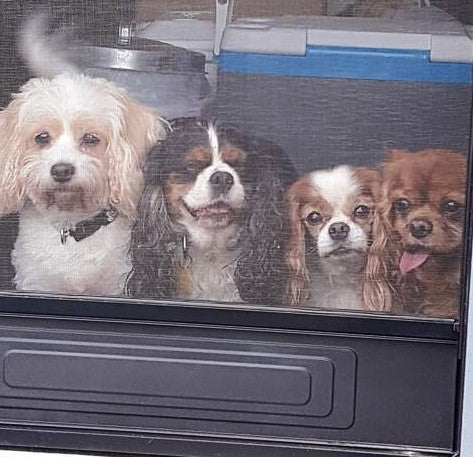Also known as infectious tracheobronchitis, kennel cough can have many causes. The most common is a bacterium, Bordetella bronchiseptica, but many other organisms such as parainfluenza, adenovirus, and mycoplasma may be the culprit or occur in conjunction. Kennel cough is spread through the air, when bacteria and viral particles are sneezed or coughed from infected animals. Crowded conditions, such as those found in shelters, kennels, daycare, grooming, dog and cat shows, or veterinary hospitals, along with poor ventilation, cold air, and cigarette smoke, may contribute to spread of disease. It is possible, however, for your pet to come down with kennel cough in your own back yard if your neighbor's dog happens to be carrying the disease or was recently vaccinated.
The airways in the nasal passages and lungs are lined with small hairs that filter out pathogens as they enter the respiratory tract. When pathogens invade, the cells lining the airways secrete liquid and mucous in an attempt to wash the pathogens out of the body. A healthy immune system will attack the invaders and destroy them. Under conditions of stress or weakened immune system, the animal will fall victim to the disease. Clinical signs of coughing, sneezing, lethargy, and inappetence may appear three to four days after exposure and may last for seven to 21 days.
Many kennels, daycare, and boarding facilities require kennel cough vaccination before an animal is allowed to visit. There are multiple vaccination types available, including intraoral (given in the mouth), intranasal (given up the nose), and injectable (given under the skin). The oral and nasal vaccinations may produce a slightly quicker response to vaccination. The injectable vaccine requires two doses be given two to four weeks apart initially, followed by annual or semi-annual revaccination (the time interval is up for debate). I do not ever recommend the injectable form of kennel cough vaccination. Only healthy pets that are not currently suffering from airway disease should be considered for vaccination. Many pets will develop symptoms of kennel cough after being vaccinated. Brachycephalic dogs and dogs with collapsing trachea are poor candidates for intranasal or intraoral vaccination. Pets undergoing surgery or any anesthetic procedure should not be vaccinated within four weeks of the hospital stay. Do not ever allow your pet to be vaccinated the same day as a procedure.
When pets are vaccinated, they will shed the bordetella organism for up to seven weeks and the parainfluenza organism for up to one week. The vaccine insert states “Contraindications, warnings: Particularly in very young susceptible puppies, mild discharges from the eyes and nose can occur from the day after vaccination, sometimes accompanied by sneezing and coughing. Signs are generally transient, but in occasional cases may persist for up to four weeks. In animals, which show more severe signs, appropriate antibiotic treatment may be indicated." Based on this, most dogs coming into daycare, boarding, or grooming facilities are constantly being exposed to the most common organisms that cause kennel cough. They will be getting "vaccinated" naturally or they will come down with kennel cough. Anaphylactic (shock) reactions may occur when the vaccine is given. Vaccines have the potential to cause harm and should not be taken lightly.
The kennel cough vaccine does not prevent the disease; it may decrease severity of symptoms if your pet is exposed. Remember that kennel cough is rarely severe and never fatal, unless complicated by secondary bacterial or viral pneumonia. It's comparable to your kids coming down with a cold. In my opinion, this is a useless (at best) and dangerous (at worst) vaccination and should not be required. I recommend finding facilities for training, boarding, and grooming that do not require this vaccine. Stand up to these facilities, offer to sign a waiver, or find another facility.
Most cases of kennel cough will resolve on their own without treatment, although the cough can certainly be annoying to all concerned. Best home remedies include steam treatment with a humidifier or bathroom steam, and a teaspoon of honey or lemon tea with honey (yup, same as people). Coconut oil (two teaspoons per day) can also be effective at quelling the cough. Good probiotics will help the immune system function more optimally. Ceylon cinnamon sprinkled on the food has antiviral effects. Homeopathic remedies can also help resolve symptoms. Foods that help drain phlegm if there is nasal discharge or a productive cough include clams, ground almonds, citrus peel, thyme, olive leaf, Shiitake mushrooms, tea, and peppermint. Any of these can be added to the meals in small amounts. For complete recipes for draining Phlegm, check here.
Disclaimer: This content is for informational purposes only and is not meant to diagnose, treat, or replace consulting a primary veterinarian for individualized care.

